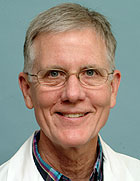Children whose asthma improved while taking steroid drugs for several years did not see those improvements continue after stopping the drugs, new results from a comprehensive childhood asthma study show.

Strunk
The results come from the Childhood Asthma Management Program (CAMP) clinical trial, in which more than 1,000 children age 5-12 were treated for mild to moderate asthma over more than four years at eight centers, including at the School of Medicine. The children in the randomized trial were divided into three groups: one received twice-daily budesonide, an inhaled corticosteroid medication; one received nedocromil, an inhaled non-steroid medication; and one group received a placebo. All children received albuterol, a fast-acting drug for relief of acute asthma symptoms, and oral corticosteroids as needed for asthma symptoms.
This study, published in advance online publication of the Journal of Pediatrics, followed up with the children nearly five years after the end of the trial. Researchers found that the children, now in their late teens, who took the medications during the trial showed no difference in their asthma control compared with the children who received the placebo.
“The interesting thing is that as kids with asthma get older, they actually do better,” said Robert C. Strunk, M.D., professor of pediatrics, an asthma specialist at St. Louis Children’s Hospital and lead author. “We used to say they were outgrowing their asthma. What we know now is that as they go from being young children to age 20, their airways get bigger. They still have asthma but don’t have as much trouble from it.”
Inhaled corticosteroids such as budesonide have been shown to be the most effective form of anti-inflammatory treatment for asthma by controlling symptoms and improving pulmonary function. Results from the original CAMP trial showed that using budesonide twice daily led to fewer hospitalizations and urgent care visits, fewer days in which additional asthma medications were needed and a reduced need for albuterol. Using nedocromil twice daily reduced urgent care visits and courses of oral steroids for severe symptoms but did not affect the number of hospitalizations, symptoms or airway responsiveness.
Although the patients had fewer symptoms five years after stopping the daily medication, Strunk cautioned that doesn’t mean that they can stop using asthma medications altogether or that their asthma is cured.
“While the kids did get better with age and didn’t seem to need the medicine as much, laboratory measurements indicated that they were still having symptoms, and therefore were primed to an attack if they got a bad cold or were exposed to a significant weather change,” Strunk said.
The researchers determined that continued benefit of these medications likely requires continued use.
“The conclusion is that some kids get better, but the doctor, family and the patient have to pay attention to the symptoms,” Strunk said. “Some of the kids are going to need medicine, and they have to be honest about that possibility.”